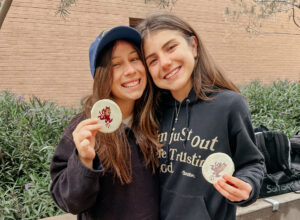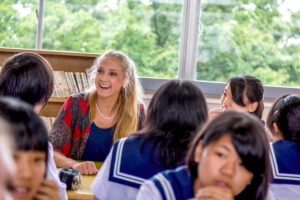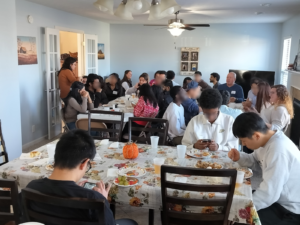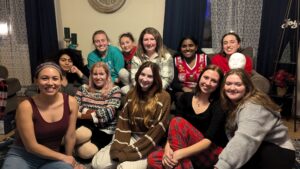
Tom Knight provides five steps to embrace the Thanksgiving holiday as an opportunity to be a global missionary in your own campus community.
With Thanksgiving fast approaching we often think of time with family, a turkey dinner with pumpkin pie, and pilgrims giving thanks to God. But we often forget that the first Thanksgiving was an international event where Native Americans and English settlers came together to celebrate a bountiful harvest around a meal. Today, we can continue to celebrate on a similar note by sharing a meal with international students during the Thanksgiving and Christmas holidays, or anytime that they are available.
In 2016 over 1 million international students and scholars came to the United States to study. They are here as exchange students, undergraduates, graduates, and scholars. They come from many different countries, cultures, and religions. They range in age from high school all the way up to middle age. They sometimes bring their children or parents with them. But one thing is common, they would like to learn about American culture and meet Americans both on and off the campus. This is a great opportunity for us as Christians to show them God’s love, hospitality and friendship through meals.
But how do we connect with these students? Here are several ways your campus ministry and church can be involved.
First, pray for God to open your eyes and hearts to the needs of students. Consider that many will be here for the first time and will be in culture shock, may not have transportation, and would enjoy having an American friend and visiting an American home. If you have ever been far away from home, you can imagine what they are feeling. Take the first step to welcome them.
Second, if you are in a urban area with local students, pitch the idea for parents of American students to consider being a “friend family” through your college or university. You could also partner with other local churches as well. Many colleges organize programs that connect international students with volunteers from the community. One may sign up through the International Student and Scholar Office. Usually these programs ask that hosts meet with the student once or twice a month. This is a great way to help the college and the international student.
Third, contact your campus International Student and Scholar Office to to see if you could host a Thanksgiving or Christmas meal for students who do not plan, or are not able, to travel. Though many students do try to get out and visit Washington D.C., New York, or some other famous place, not all do. This meal could be planned for Thanksgiving Day, Thanksgiving weekend, or during the Christmas break. A Thanksgiving banquet could also be held on campus or in partnership with a local church the week before the actual holiday. This could also be a way to explain the holiday for those who will actually be traveling for Thanksgiving.
Fourth, ask students if they would be willing to take an international student home for Thanksgiving or a weekend. This might push some students out of their comfort zone, but it could be a fantastic way to bless an international student who is always stuck on campus. Being in a home opens the relationship up in new ways of trust, friendship, and cultural learning. When I lived in China, I always enjoyed a meal in someone’s home. It allowed me to see things differently than if I just ate in the cafeteria every day.
Fifth, if you are new to international student ministry find out if there is an established ministry in your area where volunteers are needed. Volunteering is a great way to help international students, but also to bless a ministry that may need American students to round out its mission. This might be another way for you as the campus minister to provide student connections for the ministry, and for the ministry to help provide the homes where meals could be cooked and eaten. International student ministry is for the whole church, and we need to value both student and non-student volunteers.
Regardless of how you mobilize your students, you will find sharing a meal with an international student a fun, educational, and meaningful way to be God’s ambassador to the nations.
You can hear Tom Knight and Bart Glasgow discuss the power of meals and how to be a “friendship family” on the No Campus Left podcast click here to listen (iTunes).
Tom Knight
Tom is a collegiate strategist in North Carolina, specializing in international student work. He holds a law degree from Wake Forest and an Mdiv from Princeton. He is the author of No Passport Required: Collegiate Ministry as Global Missions.
This article first appeared at Collegiate Collective






